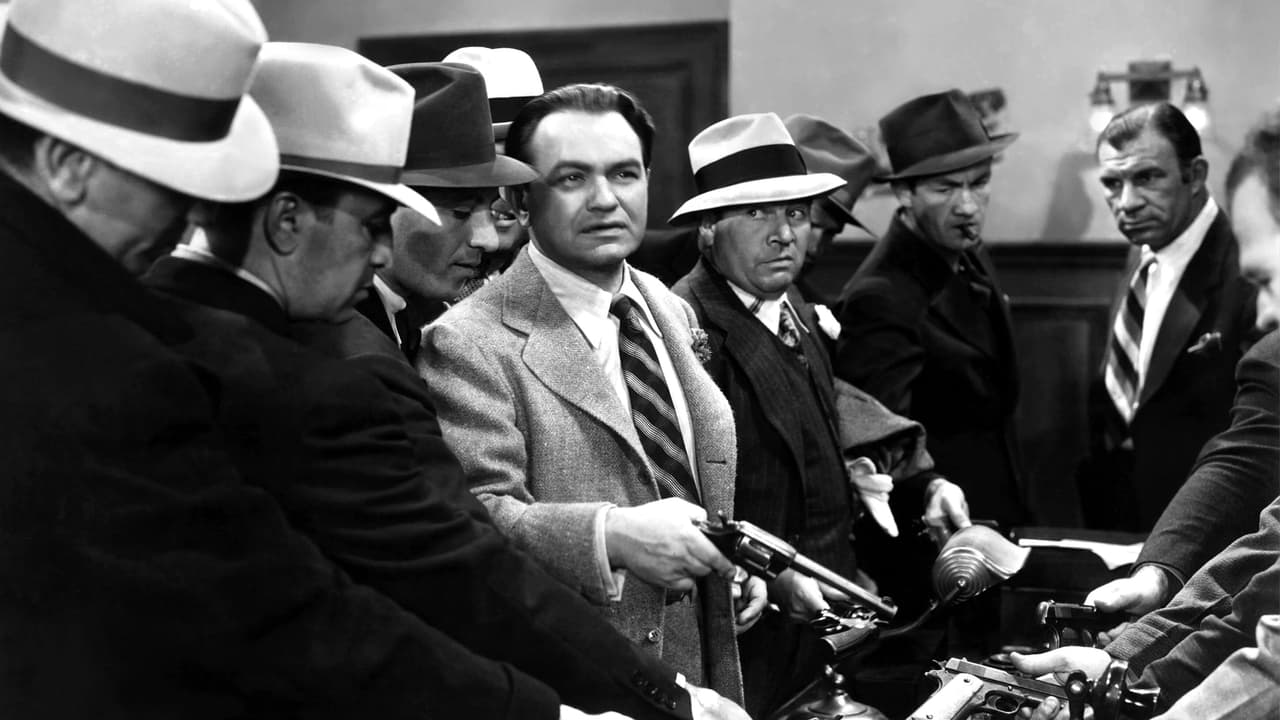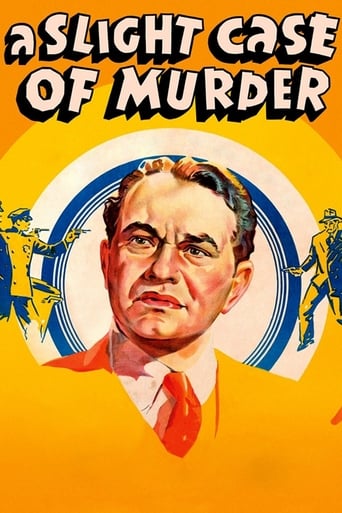ElMaruecan82
"A Slight Case of a Murder" is also one of a mildly enjoyable gangster comedy, foreseeing the laugh riots Billy Wilder would make two decades later, therefore, the fairest comment I could give is that the film was too decades ahead of its time. At the dawn of the gangster-movies' era, when the distinguished members of the murderer's row, Cagney, Muni and Raft wanted to prove their cinematic value on new fields, Robinson was no exception and the film was precisely marketed at the first comedic attempt on the gangster genre, and Robinson's first comedic role. And I guess that's the film's problem. Indeed, as comedic as it was, it didn't need to get too far from the archetypes forged by the most defining genre of the 30's. Like I said in my review of "Little Caesar", only musicals and gangster movies could drive the popularity of the talkies, and give audiences the very sensations they've been missing for decades, the sound of machine-guns and the outburst of such Napoleon-like figures as Tom Powers and Enrico 'Caesar' Bandalo, or the menacing suaveness of Tony Camonte would fascinate a public, secretly attracted to these rebellious figures fighting against the system. They were murderers, killers, but played by actors and damn good ones, actors, who knew how to inject charisma and sympathy in these (seemingly) irredeemable outlaws. Therefore, it didn't take much distance to make all these archetypes work for comedic purposes, especially for Robinson. With his catfish-like mug, his inseparable cigar, and his nasal fast-paced delivery punctuated by his trademark 'See?" and "Yeah", the figure of Edward G. Robinson was begging to be parodied in cartoons, and "Racketeer Rabbit" with Bugs Bunny was perhaps one of the greatest tributes to Robinson before Bogart would dethrone him in "Slick Hare". The gangster, as played by Robinson, was the perfect inspiration for comedy, but here's a trap where the film could have fallen into, yet thanks to Robinson's natural talent, it didn't.Robinson finds the perfect tone to adapt to comedy: he doesn't do anything, he plays his part with seriousness and it works. Even Cary Grant and James Stewart have to pull off some mimics or eye-language to emphasize their comedic style, Robinson keeps being this irreplaceable authority figure, with his cigars, his elegant suits, and his unique way to boss around his boys.. This is a credit to his naturalness when it comes to acting, he's such a larger-than-life character it's the genre that adapts to his persona, not the opposite. It kind of cancels off the whole publicity over his first comedic performance, he's still the same. Only the situations change, but then, they better be funny.The problem, once again, is that the premises are more interesting than the real thing and the film never leaves up to expectations. It starts with the celebration of Prohibition's ending, in Marko's future ex-speakeasy, a scene that reminded me of "Once Upon a Time in America" where a coffin-like cake carrying the name 'Prohibition' was shown to the guests, as if gangsters were mourning their 'Golden Age' and approaching the new one with anxiety. Yet Marko is optimistic, he plans to open many breweries all over America trusting that his Gold Velvet will be profitable. Needless to say that he'll be severely disappointed for there is a large consensus that people mostly drunk his beer because they had no alternative.Marko's quest for legitimacy is the film's running gag, while his boys, on the top of them Allen Jenkins as Mike, the right-hand man, driver and care taker, are nostalgic of the good old days. Yet it's time for all these thugs with dirty mugs to behave properly, and even Marko's wife, played by the delightful Ruth Donnelly is priceless when it comes to act sophisticated in the present to better hide a shameful past. "A Slight Case of Murder" is less about criminals than ex-criminals, and naturally, for conflict's sake, they'll be mixed up with a tedious criminal plot, making Marko wonder if he should stay on the level or make a few shortcuts with the law. Surprisingly for a gangster movie, most of it is set in Marko's mansion where four robbers were mysteriously killed by a fellow of them (the comments on their deaths are hilarious). Meanwhile, Marko visits an orphanage to pick up one of the kids for his vacation, and it's the opportunity to enjoy Margaret Hamilton as one of the workers, and one of the dead-end kids as the picked kid. Yet, he won't make much as a comic relief, and his antagonism with Jenkins fell flat most of the case. Another minor flaw is the subplot, Jane Bryan, Robinson's sister in" Kid Galahad" and his daughter now, enamored with a dull start trooper, a copper nonetheless. He comes to party with his father who suffers from heart condition, which leads to some funny yet predictable gags. Many visual gags are childish while the comedy should have relied on the screenplay thanks to the trio Robinson - Donnelly- Jenkins. I guess the premise to have Robinson in a comedy gave the film enough publicity, but it was a time where the gangster genre needed a grand finale and it would finally be over with "High Sierra". Speaking of its star Bogart, the world was about to enter a new World, a new Age, film-noir would be the new defining genre, so I guess audiences had it with old-school gangsters, and wouldn't feel the need to laugh at a gangster screwball comedy, "The Dictator" was more a comedy of its time. Even Robinson will shine in such roles as "Double Indemnity" and "Scarlett Street".A nice little comedy, but the context didn't help.
rspencer-909-101250
This movie falls securely into the beat-it-you-mugs style of lovable gangster films, fairly common in the '30s. The dialog is rife with all that faux street-tough lingo (ex., "Say, when do we tie on the feedbag?" for When do we eat?), made famous by the Dead End Kids and countless others. I happen to think it's pretty hilarious, but that's just me.This is also a "screwball comedy." Now if you'eve ever wondered about what makes a comedy "screwball," well, the key might be a storyline that disdains all the pedestrian limits imposed by a too rigid attention to the realistic and believable. In other words, to borrow a famous example, Laurel and Hardy, say, are carrying a piano across a rope bridge over a raging river. Half way across, they meet a gorilla. You get the idea.Anyway, I saw this movie when I was a teenager and thought it was one of the best of its era. Seeing it now, I still like it a lot, although it's perhaps not top-shelf. If Frank Capra had made this, the secondary storyline (gangster's daughter wants to marry a policeman!) would have been primary, and the primary storyline (gangster bootlegger, now that Prohibition is over, decides to try to be a "legit" businessman) would have been secondary, and it would have been a better movie (provided of course you had Jean Arthur and James Stewart in the roles of the young lovers). But really, there's a lot to like here.
thinker1691
In the early days of his career, the late great Edward G.Robinson, often took on roles which for him were a change of pace. Here is a good example. One of the most memorable character roles he portrayed, was the tough guy character "Rico" in 'Little Ceasar' ruler of his tiny empire. However that was when gunmen ruled the town and bootleg whiskey was all the rage. However as with every era, Prohibition was soon repealed and as in this film, the bootlegger went straight. Edward G. Robinson is now tough, legitimate and respectable, Remy Marco. Together with his wife, Mary Marco (Jane Bryan) daughter, Nora Marco (Ruth Donnelly) and his old gang plan on making a go of the new lifestyle, a brewery, making domestic beer. However, trappings of his former life follow. Several hoodlums plan on ambushing him at his Saratoga home, but end up as excess baggage and Marco must deal with them as well as an uninvited State Trooper and son-in-law visiting him at that very moment. In addition, Marco has invited a juvenile delinquent and 'Dead End Kid' Douglas Fairbanks Rosenbloom (Bobby Jordan) to come and learn how to be an upstanding citizen. The hilarity of this film is a mad-cap series of quick changing comical situations which invite humor only if one remembers how serious the 1930's were. Much more interesting is the quick thinking dialog between the characters as they adapt to life after criminal prohibition. ****

